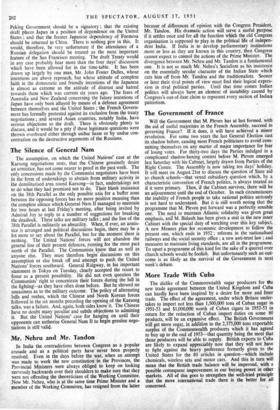More Trade With Cuba
The dislike of the Commonwealth sugar producers for the new trade agreement between the United Kingdom and Cuba can hardly have been inspired by a desire for more and freer trade. The effect of the agreement, under which Britain under- takes to import not less than 1,500,000 tons of Cuban sugar in 1951-53 and $1,000,000 worth of Cuban cigars in 1952-53 in return for the reduction of Cuban import duties on some 80 products, will be an expansive effect. The British Government will get more sugar, in addition to the 2,375,000 tons exportable surplus of the Commonwealth producers which it has agreed to buy up to the end of 1953—that quantity being the most that those producers will be able to supply. British exports to Cuba are likely to expand appreciably now that they will not have to fight against the heavy preference formerly given to the United States for the 80 articles in question—which include chemicals, wireless sets and motor cars. And this in turn will mean that the British trade balance will be improved, with a possible consequent improvement in our buying power in other markets. All of this goes to strengthen the well-tried principle that the more international trade there is the better for all concerned.






























 Previous page
Previous page